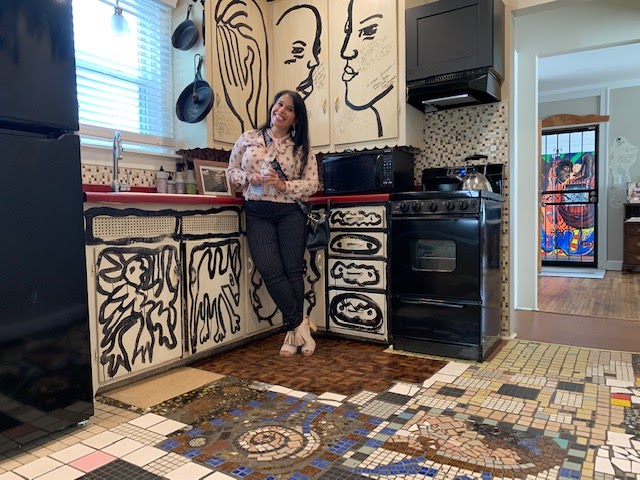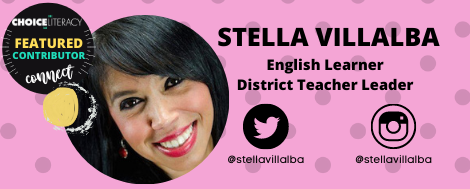When we are no longer able to change our situation, we are challenged to change ourselves.
—Viktor Frankl
[Now you can listen to the Big Fresh as a podcast!]
Don’t Leave Your Notebook Blank
I recently had a unique opportunity. I visited the house of a well-loved and respected artist: Aminah Robinson. She was an artist who documented life as it was: the beauty, the struggles, the questions, and the wonders. She created using pencils, colors, paints, buttons, fabric scraps, feathers, rocks, yarns—anything and everything had a possibility. She did not shy away from showcasing the parts of our city that made her soul sing and the parts of the city that reflected the ongoing challenges people faced. Currently in the city of Columbus, Ohio, the Columbus Museum of Art is exhibiting her work, and it’s a display of creativity and wonders. Aminah’s perspectives on life made her relatable to so many because she didn’t hide the parts of life that made it difficult. She embraced it all.
After seeing her exhibit in my city, I left feeling not only inspired but charged with actions, especially when it comes to our work in education. On one side, we hear deficit language that talks about our students’ academic lives using words such as learning loss. Yet, on the other side we hear brilliant educators saying, “Our children learned something we could never have measured: how to survive during a pandemic time.”
If Aminah Robinson were here, she would urge us to document life as we know it and as it is happening. We could learn so much from each other because our lives are so unique, and even though we are all in the same storm, we are not in the same boat. Each of our lived experiences brings a unique point of view, a learning, a realization, a growth. This summer, it is my hope that each child will get a blank notebook and go off to notice the world—to draw, collect, write, create, document. The time to start was yesterday. So let’s go.
It is not only our students who ought to document the world through their eyes. It is necessary for us, as educators, too. Don’t leave your notebook blank. Consider what you’ve learned about your students. What did they say? How do they view life? I can’t wait to see what fills our notebooks.
This week we consider craft moves for writers—plus more, as always.
Shine on!
Stella Villalba
Featured Contributor, Choice Literacy

In honor of Stella, we have made a donation to Project Amplify. Project Amplify is a national nonprofit launched to establish legal protection for children in government care. Stella’s book selection for the Choice Literacy Book Club is Hear My Voice compiled by Warren Binford. When you purchase a copy, 100% of the proceeds go to Project Amplify. We hope you’ll read along with our book club in June!

This month’s Featured Contributor is Stella Villalba. Stella teaches English language learners and coaches teachers across the Dublin, Ohio, school district. She works to bridge understandings regarding teaching English language learners. Stella is a Lead Ambassador for NCTE. She is passionate about languages, literacy, and culture. You can keep up with Stella on Twitter @stellavillalba, Instagram @stellavillalba, or her blog, Listening and Learning: A Teaching and Coaching Life. This month you’ll find her on the Big Fresh podcast and offering Choice Literacy courses. Find all of Stella’s articles and videos on the site by clicking here.

On the podcast, the Choice Literacy Book Club discussed My Hero Academia, Volume 1 by Kohei Horikoshi.
Join the Choice Literacy Book Club! Stella Villalba selected the June pick. It is Hear My Voice compiled by Warren Binford. You can hear Stella’s book talk in “the club.” Grab a copy, and join the conversation using the hashtag #ChoiceLiteracyBookClub.
Mary Helen Gensch explains how to find craft lessons in beloved children’s books. She uses a mentor text with an engaging main character to describe the process. This is the first installment in a three-part series.
Gretchen Schroeder explains how she helps her high school students play with and create better similes.
Tara Barnett and Kate Mills help young writers move away from seeing editing as “adding more details,” and toward developing more specific language for the revision process.

New members-only content is added each week to the Choice Literacy website. If you’re not yet a member, click here to explore membership options.
Gretchen Schroeder shares a summative assessment inspired by Song Exploder in which her high school students craft an argumentative essay defending a choice of a great song.
Leigh Anne Eck cracks open why dialogue is important in narrative writing and where to place dialogue in a story. She includes student samples that show the power of this craft move.
In an encore article, Kate Mills and Tara Barnett pinpoint common difficulties in sixth-grade memoir. They share teaching points and student writing samples before and after revision.
In an encore video, Bitsy Parks leads a writing share early in the year, presenting three student examples of writing and highlighting different aspects of writer’s craft linked to minilessons. (This video was published in 2020.)
Deep Dive Course: English Language Learners and Literacy Instruction: Stella Villalba provides tools, strategies, and wise advice for literacy instruction for children with native languages other than English. (This course was created in 2019.)

David Pittman unfolds a coaching process to provide teachers with a mirror so they can reflect deeply and discover their next instructional moves.
In this Coaching Minute, Inga Omondi offers wise (and fun) advice on how uplift and inspire colleagues.
Deep Dive: It’s a Cycle, Not a Hamster Wheel: Getting the Most Out of Coaching Cycles: Dana Murphy takes you into the nitty-gritty of coaching cycles with examples and advice from experienced literacy coaches from throughout the country. You’ll view videos of an initial meeting of a coach and teacher to plan a cycle and sample demonstration lessons within a cycle, as well as quick video tips for getting organized and taking good notes throughout the cycle. (This course was created in 2019.)
Quote It:
It’s one thing to understand a story; it’s another to see it in a personal way.
—Aminah Robinson in an interview for the American Library Association
That’s all for this week!




